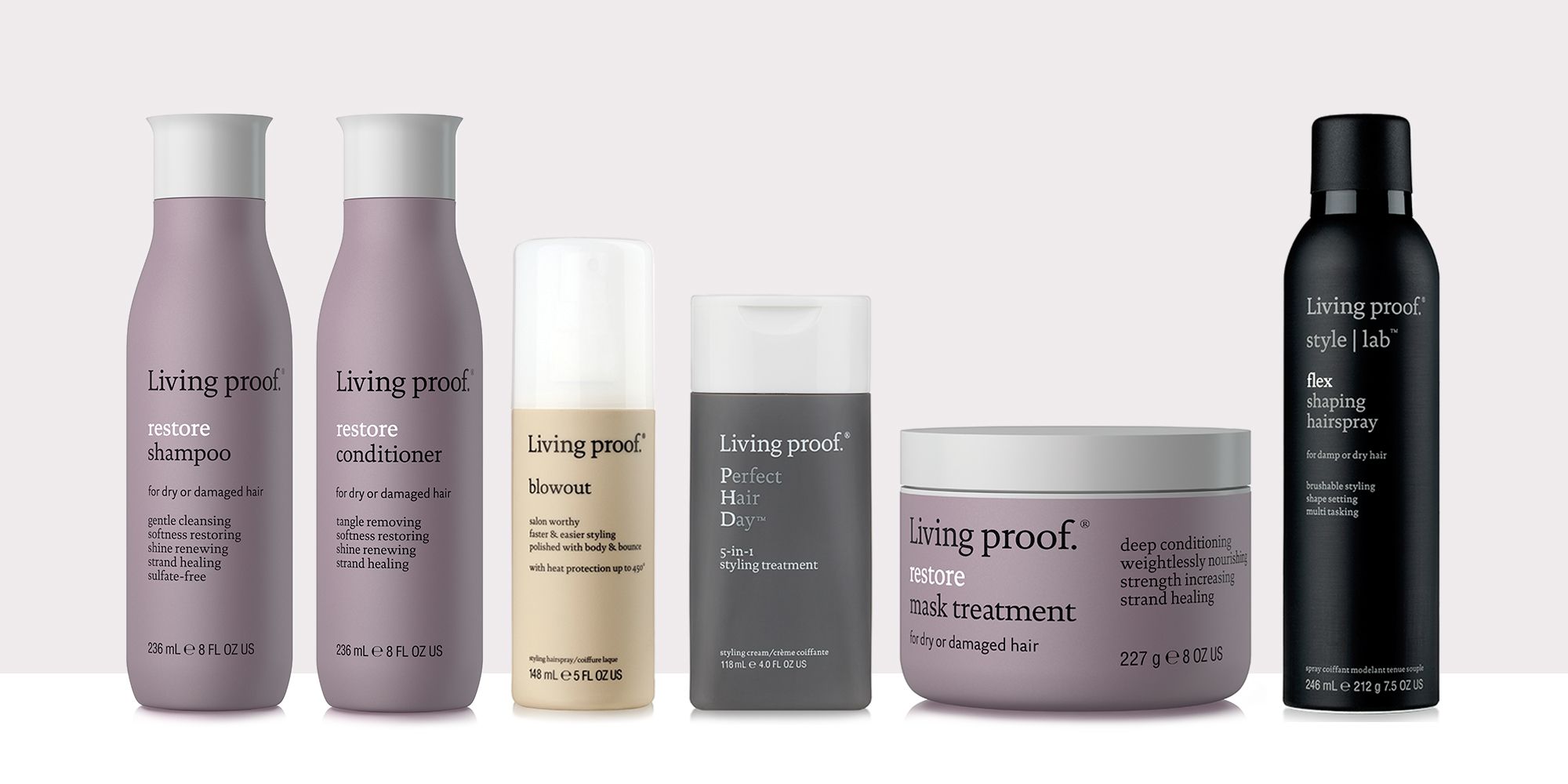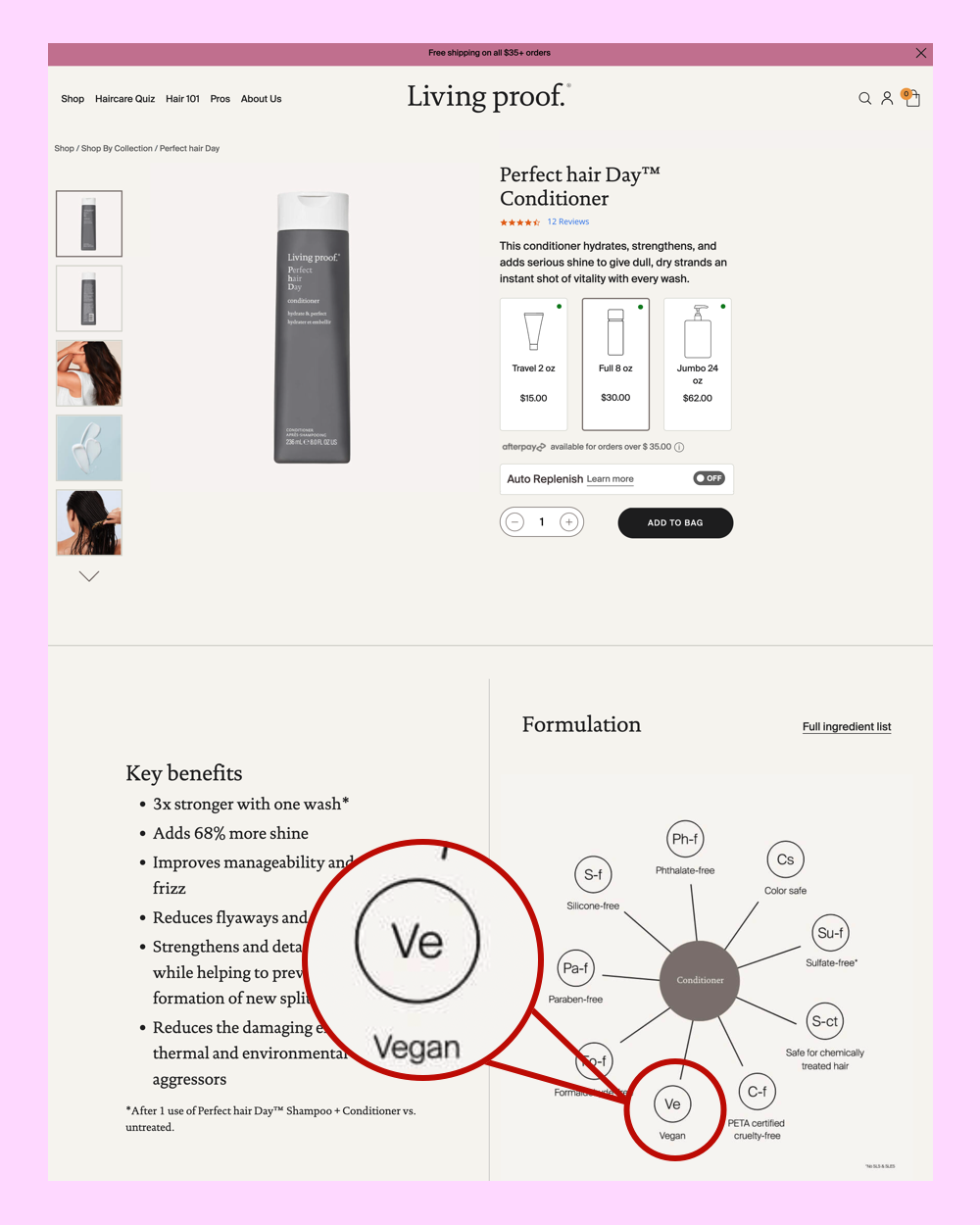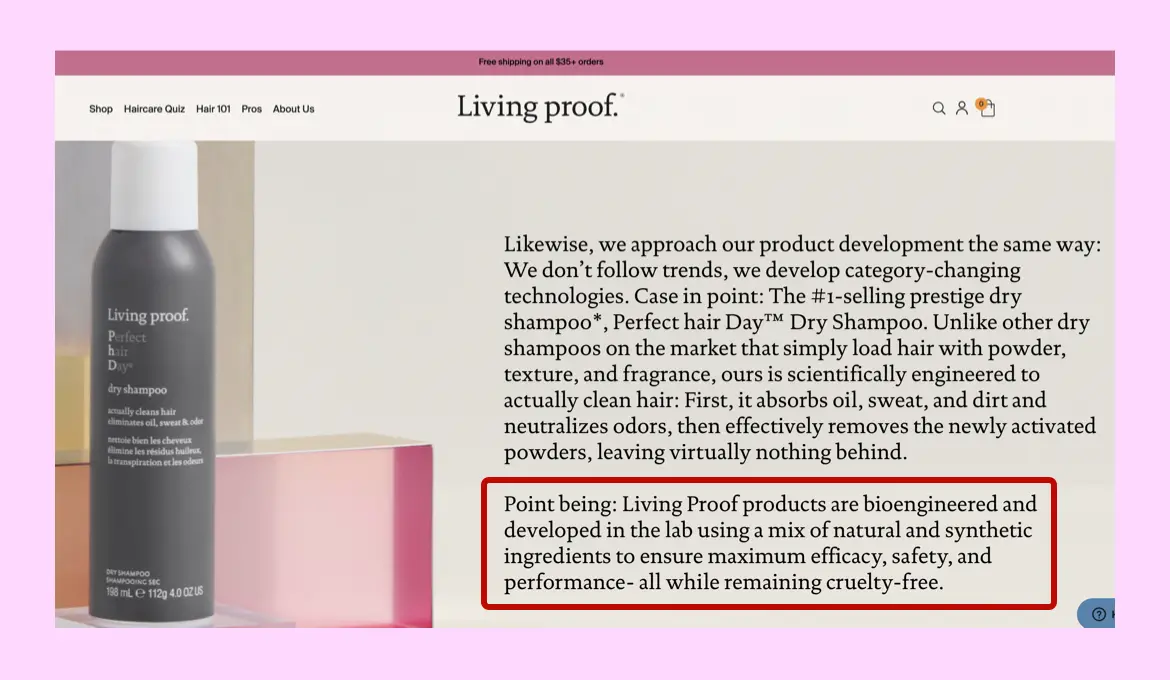Living Proof hair care uses innovative solutions to solve real hair problems. Although they claim that all their products are rigorously tested first – we want to know on what? Here are its cruelty-free and vegan policies.
Living Proof is cruelty-free. It doesn't conduct animal testing on its products, nor does it distribute its cosmetics where animal testing is required by law. While Living Proof does offer a range of vegan cosmetics, it is not considered a vegan brand.
Living Proof was founded by an MIT professor and a venture capitalist who wanted to develop research-driven products that provide solutions for every hair type.
When the brand launched in 2005, its philosophy of embracing natural textures and developing formulas that help specific hair concerns was a first of its kind.
It was a bold move, given hair trends often favored one look at a time – pressuring people to conceal the hair texture they were born with.
All their hard work paid off, and in 2016, Living Proof was purchased by Unilever from its founders and investors (including Jennifer Anniston)!
But what has Living Proof done to keep up with the times? And can we trust their cruelty-free and vegan policies?
Is Living Proof Cruelty-Free and Vegan?
Living Proof is 100% Cruelty-Free
It does not:
Living Proof is proudly cruelty-free with membership to PETA’s Beauty Without Bunnies program.
This is a good start, but…
It’s not the best internationally recognized certification to guarantee that a brand is cruelty-free.
The brand is also owned by Unilever, a corporation associated with animal testing.
This brings us to our next point:
Living Proof is Not Vegan
Living Proof is almost entirely vegan except for four products (out of more than 400).
This means you have an extensive range of vegan products from which to choose.
They also make it very easy to identify if a product is vegan once you’ve selected it. You’ll find a little infographic below the product picture with all the information you need:
The few animal-derived ingredients that Living Proof uses are:
If you're interested in which products are vegan or finding vegan brand alternatives – keep reading or click on this link: Living Proof vegan products.
Animal Testing Policy and History
Living Proof has been committed to creating effective and safe haircare and styling products that are also cruelty-free. This has been its intention since it was founded.
Cruelty-Free Status in 2022
Living Proof does not have an official statement regarding its cruelty-free policies. But they share that they’re cruelty-free under their ‘about us.’
Certification
Living Proof is PETA certified, which is not a bad start.
However, it would be nice to see more certification since it’s so proudly cruelty-free.
While you might know PETA very well – it surprisingly doesn't hold the strictest cruelty-free regulations. It seems only to require a brand's written consent that abides by the PETA code of conduct.
The Leaping Bunny association is very strict and reliable, which ensures that:
If you see a bunny stamp on the back of your product bottle – that's an excellent sign. But don't let the image itself fool you. A lot of brands are using fake logos to deceive consumers.
Do your homework and see which products are genuinely cruelty-free first. This article will help you: Which Cruelty-Free Logos Can You Trust?
Is Living Proof Sold Where Animal Testing is Required By Law?
Living Proof does not distribute any of its products to China or any country that requires animal testing on cosmetics by law.
China has a shocking track record. It is the country with the most animal testing globally, with over 20 million animals used per year.
However, if you live in China or are concerned about its cruel beauty policies, there are a couple of loopholes.
Here's how to find cruelty-free cosmetics in China: Are Cosmetics Made in China Cruelty-Free?
What Living Proof Products Are Vegan?
Living Proof only uses beeswax and a lanolin derivative in some of its products. This makes it 100% vegetarian, with an extensive range of vegan products.
It’s easier to list wasn’t ISN’T VEGAN from this brand.
To save you some time, here are some of Living Proof’s most popular and award-winning products to choose from:
You can find a complete list of Living Proof's vegan products on its website.
Vegan Alternatives to Living Proof
Overall, Living Proof is an excellent option for vegans.
With only four non-vegan products – they’re pretty close to getting our stamp of approval.
For now – we’ll award Living Proof with a cruelty-free silver star.
We also love that the brand has a clean track record and noteworthy transparency with its consumers.
For a multi-million dollar brand – it's commendable.
But if you will not support a brand that isn't entirely vegan – or if Living Proof isn’t easily accessible to you, here are some fantastic alternatives to try:
Is Living Proof Natural and Organic?
Living Proof isn’t considered natural or organic.
However, it claims to use safe, simple, clean ingredients.
Its whole ethos is to invent clean, science-backed formulas and products for any and every hair need.
Clean vs. Natural Ingredients
The term "natural" is not regulated for cosmetics and skincare. In other words, it doesn't hold one specific meaning.
Usually, it means a product is free of more toxic synthetic ingredients, including parabens, phthalates, sulfates, and more. But people also interpret "natural" to mean ingredients of immediate plant origin.
Here's the thing: "natural" is not necessarily good. Just because an ingredient is natural (take lemon, for example) doesn't mean you should rub it into your hair and risk damaging the hair cuticle!
All products use a certain amount of synthetic ingredients in their formulas. Living Proof is no exception – but it does choose to use better or clean synthetics.
If a synthetic ingredient is "clean," it means it is safe and non-toxic for us. Its purpose is to preserve the stability of a beauty formulation.
Does Living Proof Use Safe Ingredients?
According to Skin Safe, Living proof has an average 82- 91% allergen-free ranking across 117 products.
All Living Proof products are free of silicones, phthalates, parabens, and sulfates. The brand also avoids nickel, gluten, propylene glycol, and dyes.
Reading the ingredient list is crucial because Living Proof is not 100% hypoallergenic or non-comedogenic, and they do not claim to be.
However, certain products are specifically for these concerns, so make sure you buy what your skin needs.
The EU/UK Have Stricter Ingredient Regulations
We don’t want to scare you, but you HAVE to read up on any product’s ingredient list before you make a purchase – especially if you live within the United States. The reason why will shock you.
The FDA has only banned or restricted 11 harmful chemicals from cosmetics within the country. Europe and the UK, on the other hand, have banned 1,328!
Luckily there’s not much to worry about with Living Proof, as it prides itself in creating clean formulas. However, you should always check the back of your hair care products and avoid these ingredients:
Are Cruelty-Free Ingredients Safe?
If you’re worried about how safe it is to use cosmetics not tested on animals – please relax and take a sigh of relief.
There is no reason why cruelty-free products shouldn’t be as safe as anything tested on animals.
Not only is it easy to test ingredients without using animals altogether, but there are so many pre-approved ingredients you can use to make cosmetics that there is no need.
If you’re interested, here’s more on the subject: Are Cruelty-Free Cosmetics Safe?
Is Living Proof Sustainable and Ethical?
Living Proof has some sustainability and ethical initiatives that align with the company values. It wants to:
It's no secret that the world has a huge waste problem, and cosmetic brands only make it worse by using unsustainable packaging and harmful ingredients.
Some of the ways Living Proof is taking strong environmental accountability is by:
But we cannot help but feel it could up their game here.
Here are some environmental policies we’d like to see the brand expand to include:
Final Thoughts
Living Proof is a well-developed haircare brand that considers some ethical factors. The fact that they are cruelty-free is a step towards a more sustainable future in beauty.
We appreciate that it has a transparent supply chain and is open to the public about its testing, purchasing, and distribution policies.
Living Proof is about being science-backed and cruelty-free. It shows that science doesn’t always need to be associated with animal testing.
While it is not 100% vegan – its vegan lineup is impressive. But, it might not be the best choice for activists who go the extra mile. Especially since the brand has so few sustainability and ethical initiatives that competitors have invested in.
But we wouldn't shut it down so quickly if we were you. This MIT-born brand is developing and listening to your needs, so keep following its movements.



